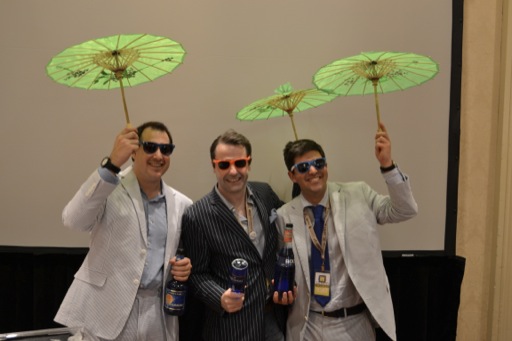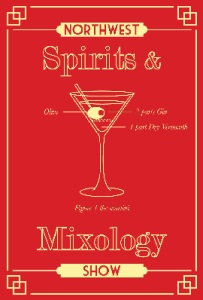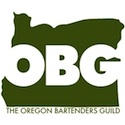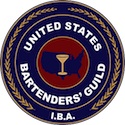Tales of the Cocktail: Tangled Up in Blue
August 31, 2012 by Mr. Boozenik
Filed under Spirits Events

“Welcome to the first, and maybe the last, technical analysis of blue as a cocktail color, especially as presented by people in white suits that stain really quite well”. And with that, Jacob Briars, Sebastian Reaburn, and Philip Duff began their entertaining discussion of the color blue in historical and modern cocktails.
Firstly, there was the obvious discussion of what is actually blue, as far as unadulterated food and drink. “Nearly nothing” is the actual answer. Even blueberries are more or less purple, rather than blue. But that rarity is why the color blue becomes more interesting than most other colors, when discussing solid or liquid comestibles. It easily generates a cognitive dissonance between expectation and perception.
Similar to how a loud shout and clap will surprise someone and intensify an experience, making a vivid impression, a jarring color combined with a totally unrelated flavor will do similarly. And blue coloration is not alone in this. For example: what exactly is red in the flavoring ingredients of Campari? Nothing at all. But the vibrant color helps make the flavor seem more intense and intriguing precisely because of that cognitive dissonance.
Starting the discussion of how blue in particular came into drinks took us back to the 1850s, and Alexis Soyer, who was more or less the first celebrity chef in Europe. This prolific inventor of kitchen technologies was also known for making (some of) the first bottled sauces and condiments. And related to that, he created the supposed first pre-bottled blue drink: “Soyer’s Nectar” a “sadly non-alcoholic”, beverage, which was apparently a blue-colored pear and cinnamon soda. I consulted the web after the fact and found another reference which describes it as lemon rather than pear, but concurs on cinnamon, and more importantly, the blue coloration. In any event, the original recipe was a secret and is now long lost, but the odd torpedo-shaped bottles marked “Soyer’s Nectar” occasionally can be seen on antique glassware sites.
Over time blue (and red and green and orange) colors began to appear in different flavoring liqueurs.
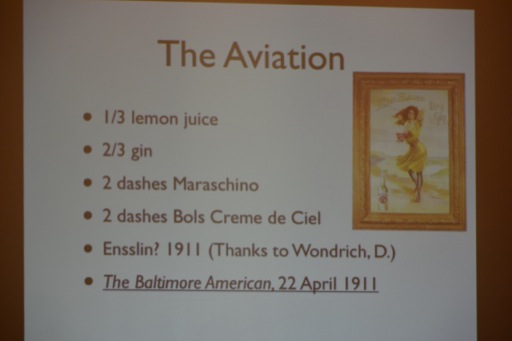 Of the blue ones, blue curaçao is the one we know now, but before blue curaçao, there was another blue spirit: Bols Crème de Ciel (“Cream of the Sky”). It was suggested* that Crème de Ciel was the other lost ingredient in the Aviation, since it would give it a more sky blue color than the grey-violet from Crème de Violet.
Of the blue ones, blue curaçao is the one we know now, but before blue curaçao, there was another blue spirit: Bols Crème de Ciel (“Cream of the Sky”). It was suggested* that Crème de Ciel was the other lost ingredient in the Aviation, since it would give it a more sky blue color than the grey-violet from Crème de Violet.
In any event, now blue curaçao is now nominally thought of as one of Bols’ signature liqueurs, and there’s far more made that is colored blue than is left clear, or colored orange.
And for those who want to keep score on the various forms of curaçao out there, we tasted 5: one a new non-colored curaçao from Pierre Ferrand, 3 brands of blue curaçao, and one unfortunately grey fresh-made one. Here are a couple quick comments to guide you:
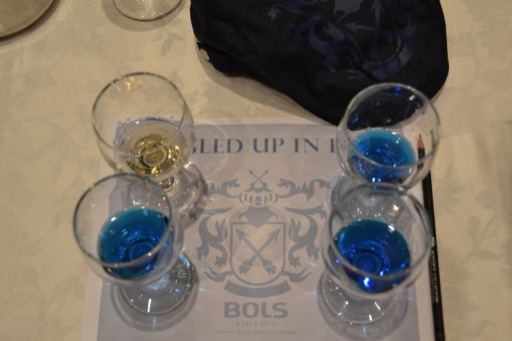 Pierre-Ferrand Dry curaçao (sadly not blue): crisp, pronounced orange, fairly rich, but dry
Pierre-Ferrand Dry curaçao (sadly not blue): crisp, pronounced orange, fairly rich, but dry
Bols: vibrant blue, with a nose and flavor full of mandarin, bright and fruity
De Kuyper: a more turquoise hue with both orange and lemon present, with some cardamom and vanilla notes
Giffard: light azure color with flavors and aromas of orange peel, bitter orange, with hints of vanilla, and a long warm finish.
Combier “gray” curaçao: only oranges, colored with petal extract, and with an aroma of watermelon, with berry and range notes. Frankly, with it’s appearance, if could only be called unfortunate, since I really doubt there will be a future seminar on grey cocktails.
In any event, all of these curaçao variants will be different overseas. The U.S. has its own rules, but “when you travel expect better”.
But what to do with them? Inspiration can come in many forms. “As I was getting increasingly drunk and with 14 extra bottles of blue curaçao, I thought ‘Fuck the Corpse Reviver Number Two, I want a Corpse Reviver Number Blue!’ With that, Jacob’s interest in blue cocktails began. But for others…
| Ideas range from the fairly traditional Blue Hawaiian | to Jacob’s Bl’Aviation |

|
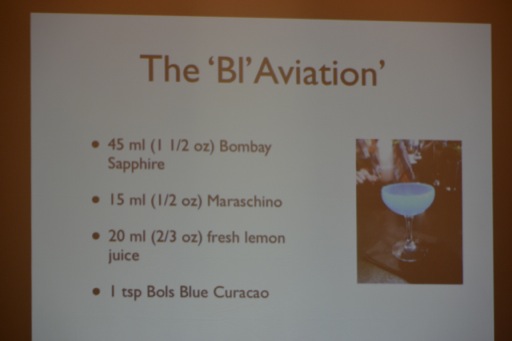
|
Any way you do it, a touch of blue added can give a striking look to a cocktail.
* Footnote:
A bit of caution on taking everything they said at face value: While snappy dressers all, it is not lost on me that all of the presenters are from places England used as prisons.
